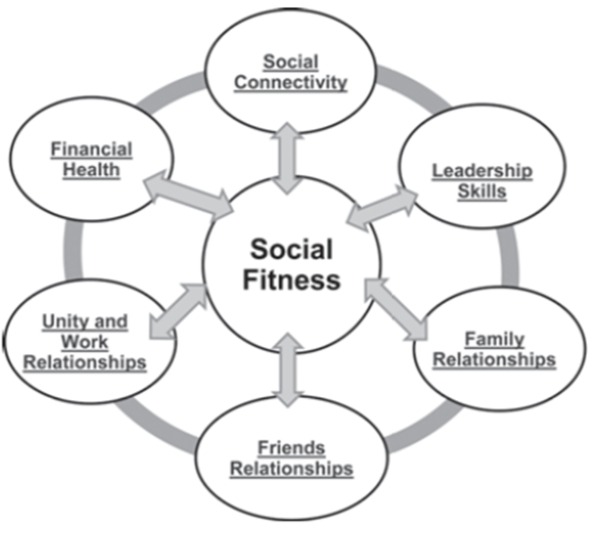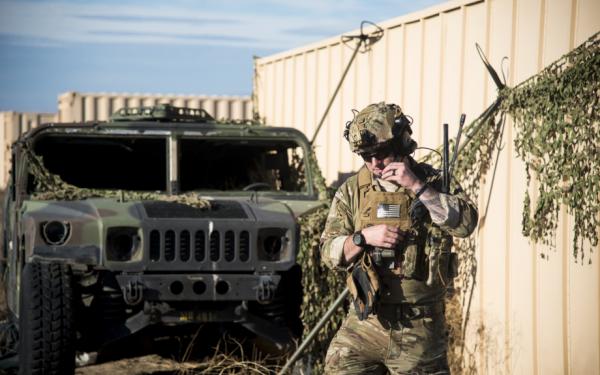Social fitness is also interrelated with different aspects of psychological fitness including attention to social cues, regulation of emotion, social problem solving, and adaptability and flexibility to changing cultural and social rules. Likewise, beliefs and appraisals associated with psychological hardiness are thought to enhance one’s ability to both develop and utilize effectively social support systems. (Military Medicine, Volume 175, Aug 2010, pg. 32)
Get a FREE Copy of the Be a Boss on the Battlefield and in Life Video Series!
In my last post, I discussed the importance of physical, mental, and spiritual fitness as attributes military professionals need to have individually. Just as important, it is essential to help these professionals have the skills and opportunity to develop a strong sense of social fitness. Military Medicine, Volume 175, Aug 2010 journal on pg. 89 highlights the importance of these aspects of social fitness in the chart below.

It is important that warriors develop rapport with people in peacetime so during the heat of life’s battles, they have men and women behind them who have their six especially in their family lives. I was listening to a video where I heard a former 101st Army Airborne soldier say something profound…”You want to be a good family man and you want to be a good solider, its hard to do both so you choose one.” Typically what I’ve seen in my career is exactly that. Those who are great at being military professionals but have struggles on the family side will choose to be almost too one sided in pursuing their careers at the detriment of their families. I will never forget during one TAD listening to a story about a Chief Warrant Officer whose ex-wife told him something to the effect of, “you are a great Marine but you were a terrible husband.” Ouch. That being said, I have also seen examples of professionals who were amazing warriors AND amazing leaders in their family because they knew how to balance both.
Coaching and modeling the social skills necessary to help service members have strong family bonds both in their immediate families especially with spouses and children as well as with parents, siblings, and extended relatives is super critical to the long term health of individuals in uniform and when they transition back to full time civilian life.
In addition to this, service members must be developed as a cohesive team and taught how to manage their social resources well in order to provide personal growth and protective factors against adversity. It is well known that warriors in combat fight for each other to include giving up their lives when they operate in an emotionally tight unit.
One aspect of military social fitness includes the ability to emphathize and connect with others especially in terms of relating as much as possible to civilians at home or foreign nationals aboard during operational missions. Teaching and modeling positive communication skills in difficult situations or simply to develop rapport with foreign partners and supporters at home is crucial if service members are to successfully build relationships that allow for mission completion and a positive image of the military service.

Besides having strong relationships with family, friends, and fellow professionals, maintaining financial health is crucial to the social fitness of a service member. If a military member is concerned about their finances, it is likely they are not going to be as focused on the job at hand. Furthermore, they can get into trouble such as steep indebtedness which deeply affects morale and the ability to maintain a security clearance. Often, the most important but overlooked factor of financial health is helping young service members especially obtain basic education on how money and life decisions are related along with understanding the importance of emergency savings, developing and living on a budget, understanding the basics of investing, and avoid indebtedness or at the very least manage it well, and knowing how to leverage various insurance policies to manage risks to health and life.

Lastly, in terms of developing social fitness, it is crucial to model and teach military professionals critical leadership skills that will enable them to positively influence senior leaders, peers, and subordinates both in peace and war. Leadership is talked about often in the military culture, but the art of truly seeking to intentionally develop people at all levels to be productive and healthy all around is often neglected in favor of managing tasks necessary for mission accomplishment. In other words, there has to be intentionality in modeling competence and character on the whole as well as seeking to develop it in others vs. narrowly minded focusing only on managing task accomplishment. This requires modeling and intentional coaching of professionals at all levels to own their personal growth and seek to enhance the growth of those around them. This also includes helping military professionals understand how to influence and guide others whether they have formal authority over them or not especially when given complex and difficult tasks in ambiguous situations. This is a multi-faceted process with no end of books, videos, and audio presentations on. It is generally caught more than taught as well and is something that truly must be alive in the day to day life culture of military individuals and units vs. just paid lip service to.
Understanding the importance of social fitness is not hard on the surface to intellectually understand especially when seeking to integrate and use this aspect of total force fitness with other attributes we mentioned before. Of course, the entire concept of total force fitness is easier said than done even if one understands it. So why is it so hard to accomplish? In the next post, I'll uncover issues on this phenonemon. In the meantime, please take advantage of checking out MSgt John Rudd's lessons on how he learned the hard way the importance of developing individually and later for his Marines total force fitness in very practical ways by gaining free access to Be a Boss on the Battlefield and in Life.
Fit for the Fight and Life,
Chris
Chris Reardon
Major, USMC
Founder/Director of Freedom Fitness America
Email: chris@freedomfitnessamerica.org
